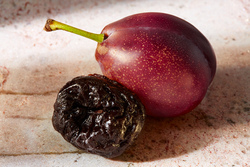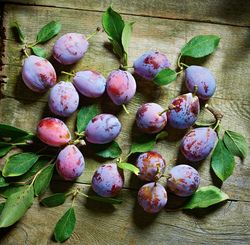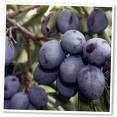Eating a small portion of prunes daily can help weight loss and decrease appetite, according to new findings from the University of Liverpool.
The research also reveals that prunes contain no more sugar than a plum, its fresh fruit equivalent.
The study showed that including a modest portion of prunes as part of a weight loss diet, produced significant changes in body weight and waist size. There was also a trend for the prune eaters to achieve greater weight loss during the last four weeks of the study and long term effects on appetite were also observed.
The researchers concluded that including prunes into weight control diets may be of benefit to long-term success, by tackling hunger and satisfying appetite.
Natural dried fruits
Dieters have tended to shy away from dried fruits believing them to be higher in sugar than fresh. This perception has been reinforced by the introduction of dried fruits with added sugar, such as cranberries and fruit juice infused dried fruits. But traditional dried fruits, such as prunes, are simply dried plums, with the same natural sugar content as their fresh counterparts and no added sugar. One plum becomes one prune, water removed, so the calorie content remains the same.
Plums beneficial to teeth and gums
Another concern about snacking on dried fruit, is dental health. Cariogenic bacteria utilise sucrose to produce harmful acids and dental plaque, yet sucrose is minimal in prunes (0.15g/100g), the main sugars being fructose and glucose. California prunes also contain 26.5% carbohydrate as non-fermentable sorbitol, which is used widely in chewing gums for its low cariogenicity. Research on prunes is confirming that they contain certain bioactive compounds with antimicrobial properties, capable of inhibiting the growth of bacteria that cause cavities and gum disease
Professor Jason Halford and Dr Jo Harrold, Institute of Psychology, Health and Society, Liverpool University, presented initial results at the 2014 European Congress on Obesity , having assessed the effects of prunes on weight and appetite by studying 100 overweight and obese low fibre consumers – 74 women and 26 men; 43 years; BMI 29.8 in a 12-week study. All subjects received the same standard dietetic weight loss advice, plus the prune intervention group were provided with 140g/d (171g for men) prunes for snacks, whereas the active control group were advised on healthy snacks.
The study showed that including prunes as part of a weight loss intervention, produced significant changes in body weight (1.99kg/2.4%; p<0.000) and waist circumference (2.5cm/2.3%; p<0.000) from baseline. There was a trend for the prune eaters to achieve greater weight loss during the last four weeks of the study and enduring effects on appetite were also observed with AUC (area under the curve) analysis demonstrating increased fullness in the prune group after week 8 (p=0.05). It is worth noting too that study compliance was good and, despite the high daily doses, the prunes were well tolerated. The researchers concluded that including prunes into weight control diets may be of benefit to long-term success, by tackling hunger and satisfying appetite.





